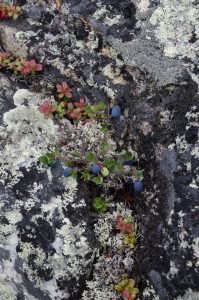Lakeside dispatch from David L. Witt/July 27, 2015/3:00pm
{In late July and early August I led an expedition to Aylmer Lake in the Canadian Arctic. We were following part of the route taken by Ernest Thompson Seton and his expedition of 1907. Field notes from the expedition can be found at my Seton website. This essay and others were first published by the expedition’s sponsor, the Academy for the Love of Learning, at the Seton Expedition website.}
Land and water. Burned forests and ice floes. Endless shore-lines, tiny birds. Mosquitoes, mosquito head nets. Grizzly shattering glass and lunging through a cabin door, grizzly shot dead. A vast bay of the lake, a tiny canoe touching the water-shore horizon line on the other side. This last view, a wolf’s eye view as it might have beheld Seton and Preble on their visit 108 years ago when they met the wind silence of Aylmer Lake.
In 2014 the Northwest Territories experienced, at the same time, its coldest and driest summer in memory. One could have seen from the frozen shores of Aylmer Lake in the third week of July the smoke of unprecedented and ruinous fires in the Boreal forest 90 miles south. This year warmer, with the major fires still to come.
The late summer of Seton’s visit to the lake may have been a cold one; there was no mention of fires; it was certainly storm-ridden, gray-clouded over desolate shore, but also with the tundra’s reddish carpet of grasses, specs of wildflower yellows and blues, the last white remnants of cotton grass. Here on a windy day the human voice is washed away as thoroughly as the clear water wave cleaning the sculpted shoreline rocks.
Of all these contrasts, the one I find particularly interesting is that of talk, no talk. For the four men on that long 1907 trip, endlessly paddling every day week after week (except when in even closer quarters when storm-bound) I imagine there was limited talk. What else could have been left to say after such a long time together? What might have the two white men and two Indians to say to one another that could possibly have been interesting to the others?
I believe they must have gone through long periods when their thoughts were accompanied by nothing beyond the natural silence of a land of contrasts.
<Tundra blueberries, Northwest Territories, dlw photo>

